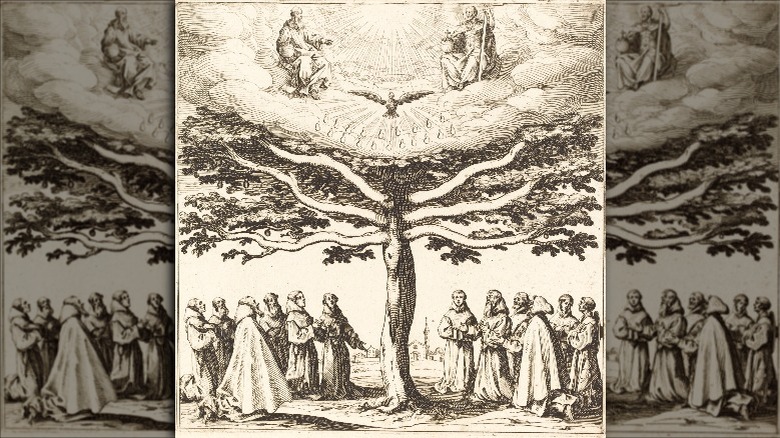The Meaning Of The Number 3 In The Bible Explained
The Bible is often referred to as the "word of God." In reality, it could just as easily be described as a book of holy numbers that operate symbolically to demonstrate Biblical doctrines that could not be expressed by words alone.
Arguably the most important, illustrative, and instructive number in the Bible is the number three, which appears throughout the text a total of 467 times (per Bible Study). Speaking to The Kansas City Star, the Rev. Penny Ellwood, Blue Springs campus pastor, United Methodist Church of the Resurrection, describes the notable recurrence in the number three in both the New and Old Testament:
"The use of the number three is abundant in the Bible. Noah had three sons (Gen. 6:10). Three visitors appeared to Abraham (Genesis 18:2). Jonah was inside the belly of the fish three days and nights (Jonah 1:17) ... Jesus answered Satan's threefold temptations with three scriptural references (Matthew 4:1-11). Jesus' ministry lasted three years. Peter denied Jesus three times (Luke 22:54-62), and three times Jesus affirmed his love (John 21:15-17) ... There are many references to the number 3 but nothing quite as important as the climax of our faith and Jesus' redemptive work, his resurrection on the third day (Luke 24:7)."
Christianity.com points out that three is often used syntactically: "Holy, holy, holy." So why is it so prominent?
The number 3, completeness, and the Holy Trinity
As described by Bible.org, the number three recurs often in the Bible to serve a number of "rhetorical and literary uses." For example, think of the structure of a typical joke or non-Biblical fables, and you will notice that such texts are typically structured in three parts. But per the same source, the number three also serves as something of a motif. There is no literary necessity for Jesus to have been resurrected on the third day, nor for Jonah to have been in the belly of the fish for that time.
Christian scholars have claimed that this motif works as a reminder of the doctrine of the Holy Trinity, which itself expresses God in His perfection prior to the creation of the world (via Bible Study Tools). Through such a doctrine, God expresses Himself in three parts: the Father, the Son, and the Holy Spirit. This formulation is accepted by the majority of the world's Christian denominations, such as Catholicism and Protestantism, while some — such as Unitarianism and Christian Science — reject it.
"The number 3 should merely be held as a significant number within the Christian faith rather than a holy number. An item that is deemed holy is something dedicated or set apart for God. The number 3 does not fit the category of holiness, but neither should it be overlooked in its biblical importance," the Rev. Jeff Palmer explains (via The Kansas City Star).

